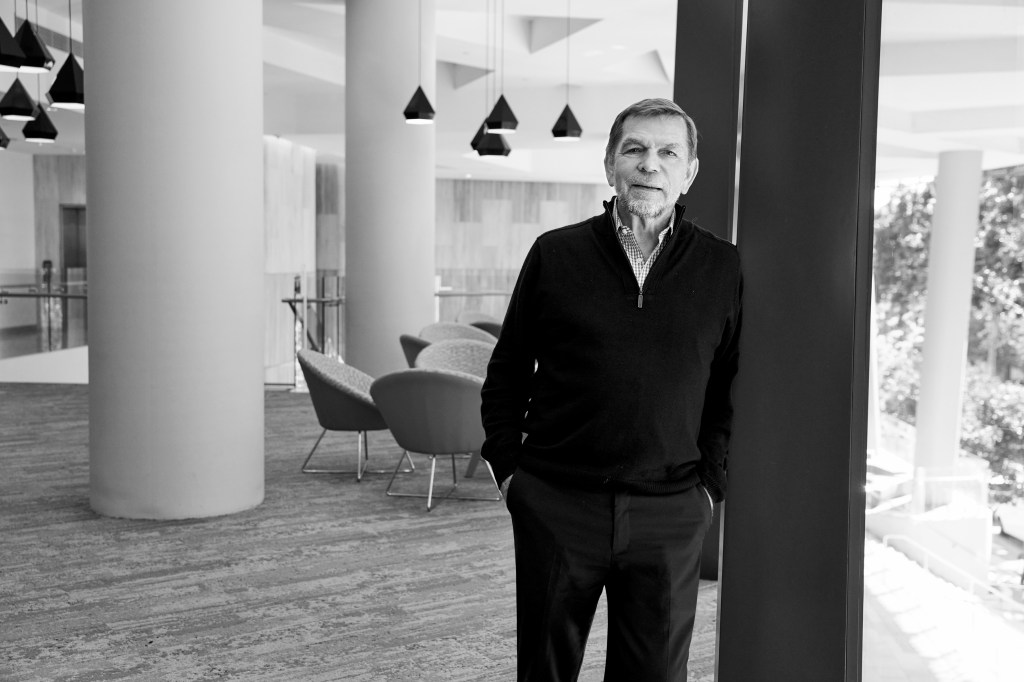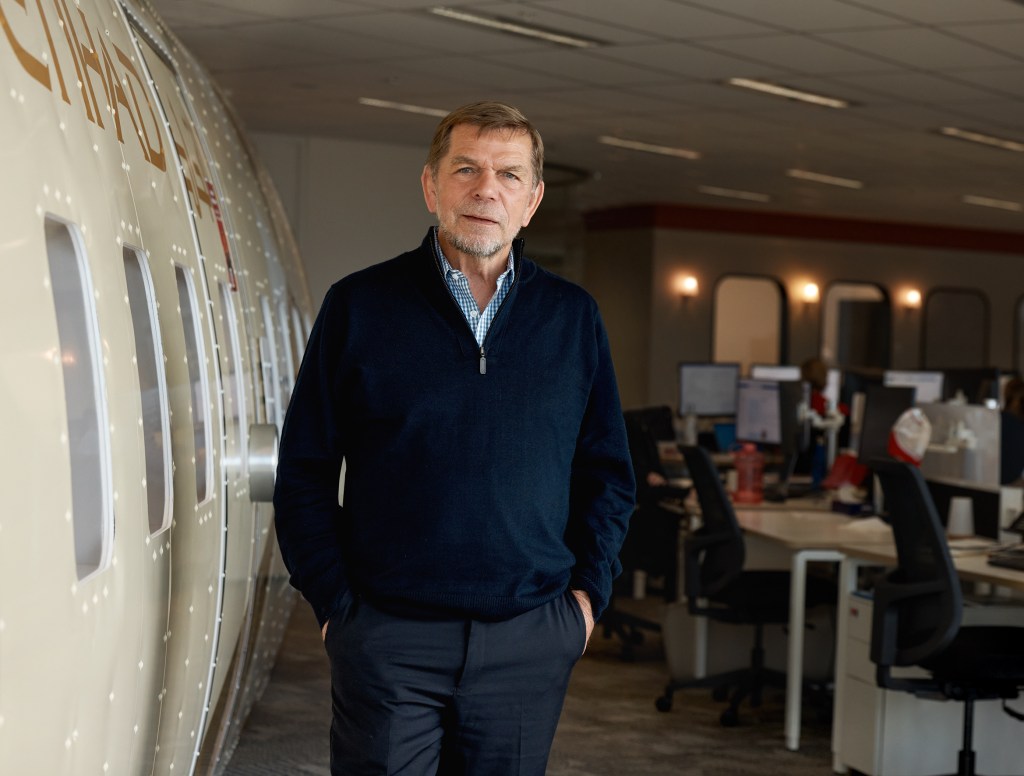Travel industry juggernaut Flight Centre Travel Group hit a share-price peak of over $60 in 2018. On March 19 2020, it crashed to just under $9. While the now-$5 billion business has made ground since the pandemic, the good times are a way off. But founder and CEO Skroo Turner and his Flight Centre crew believe they can get there thanks to a reinvigorated business model and change in direction.

It’s Friday the 13th of March, 2020, and Flight Centre Travel Group (FCTG) chief operating officer, Melanie Waters-Ryan, is in New Zealand holidaying with her daughters when she gets a call from the company’s chief executive of corporate travel, Chris Galanty.
“You’ve got to come back,” he says. Borders were closing imminently as a response to the spreading COVID-19 virus. She booked a flight and spent the last 24 hours of her vacation researching one thing: war rooms.
She landed in Australia four hours before the government implemented its two-week quarantine rule for overseas travellers, and by 6 am Monday the 16th, she was in Flight Centre’s Southpoint HQ locked in a meeting room with founder Graham (Skroo) Turner and four other senior executives.
“I didn’t leave that room for 27 days,” she says.
By the time this publication hits newsstands, Waters-Ryan will have retired from her role after more than three decades with the company. But the memory of standing three-quarters of the staff down and ultimately making them redundant has certainly left its mark on her.
“I’ve been at Flight Centre for 36 years,” she says. “I’ve been through various downtimes – Gulf War, Bali Bombings – you name it. This was off the Richter scale.”
Flight Centre Travel Group was listed on the Australian Securities Exchange in 1995 and saw a steady ascension. Its first major dip happened after the Global Financial Crisis in 2008, when the share price tanked to just under $4. It slowly recovered and, by 2018, had rocketed to more than $60 per share. But on March 19, 2020, the company had lost more than 85% of its peak value, crashing to under $9. Today, the company’s market cap is around $5 billion.
“There is no comparison to COVID – it’s light years ahead in terms of the devastating effect of it,” Turner says. Turner, who gets his nickname Skroo from the Turner Screwdriver, is the managing director of FCTG and a 15% shareholder of the company. In the ASX bloodbath of March-April 2020, he lost $500 million of his wealth. While his co-founders Bill James and Geoff Harris have sold much of their shareholding, Turner has remained steadfast. Today, his share is worth nearly $700 million.
The three are still good mates, they all attest, but it made sense for Turner to stay on and steer the ship. “He was very good strategically,” Harris says. “He has a wonderful resilience – he’s a rare beast.”
The Flight Centre story
Turner, a Queenslander and veterinarian by trade, spent much of the early 70s when he was in his 20s travelling Europe in a Kombi Van with his mates before mulling over a tour group idea with a friend, Geoff ‘Spy’ Lomas, in Munich’s Hofbräuhaus during the 1973 Oktoberfest. Later, travelling through England, he stumbled on an old WWII airfield filled with double-decker buses. He convinced Lomas to go halves on a 700-pound people-mover, and the pair started Topdeck Travel with a tongue-in-cheek slogan: ‘I like it better on top.’
They advertised a six-week tour of Spain, Portugal and Morocco 50 years ago this November, gathered 20 passengers and charged 110 pounds each. By 1975, Topdeck had turned a 15,000-pound profit. By 1980, Topdeck was a fully-fledged tour operator in Europe and one of four remaining on the continent. It still exists today as a branch of FCTG.
“We had operating costs of $227 million each month. We needed to reduce that to $65 million quickly. A lot of that was people cost – it was an enormous challenge.”
– Graham Turner, Flight Centre co-founder and CEO
In the meantime, Turner had a mate in the UK making money through discount airfare stores called bucket shops.
“To get rid of empty seats, airlines would often give unlicensed travel agents discounted airfares to sell. So, we decided to set one up in Prudential Arcade [now The Strand] in Sydney,” he says. By 1982, there were nine bucket shops and roughly 50 employees in Australia. Mind you, it was illegal at the time to discount airfares, and travel agents could be prosecuted for slashing official prices due to regulations.

“Interestingly, although we would advertise discount airfares for the next few years before it became legal, we never got prosecuted,” Turner says. “Quite a few other travel agents did, but we were just lucky, I guess.”
By the end of the 80s, Flight Centre (as it is today) was an amalgamation of 30 different shops with 30 different shareholders, including James and Harris, who have since exited the business to pursue other interests (but remain shareholders). The business decided to unify under the Flight Centre Australia brand, now Flight Centre Travel Group, around the same time the airline industry deregulated in 1990. In 1995, its profits surpassed $10 million for the first time.
Flight Centre’s COVID battle
But the pandemic of 2020 disrupted much of Flight Centre’s early success in an instant.
“We had operating costs of $227 million each month,” Turner says. “We needed to reduce that to $65 million quickly. A lot of that was people cost – it was an enormous challenge.”
Waters-Ryan says turnover tanked 90% in a week, and the leadership team was forced to embark on a major cost-reduction strategy. “We knew we needed to raise capital, which meant we had to reduce our running costs severely,” she says.
“I’ve been through various downtimes – Gulf War, Bali Bombings – you name it. This was off the Richter scale.”
– Melanie Waters-Ryan, former COO of Flight Centre
“It was scary – but it wasn’t scary, like, ‘Oh my God, we’re going to go out of business.’ It was, ‘What is happening?’ And, ‘How long is this going to last?’ Our immediate concern was to organise ourselves, so we broke up our business into key parts: people, property, marketing and general expenses.”
People and property had to go. The company axed three-quarters of its workforce and more than half its retail footprint. It entered a share trading halt in April 2020 and soon after announced a $700 million fully underwritten capital raise, issuing 97.2 million shares at $7.20-per-share, a 27.3% discount to the last traded price before the raise.
“I remember thinking, ‘That’ll get us through to Christmas. But if it goes beyond Christmas, we’ve got big problems.’ Well, it went to another Christmas.” That raise resulted in a major dilution of ownership for owners – particularly the company’s co-founders.
Before the raise, the Flight Centre founders held 42.21% of voting power (of a total of 101.14 million shares), and despite contributing approximately $20.8 million to the raise, the founders held just 25.7% of voting power afterwards.
“I still can’t believe we survived it – thanks to Skroo and his executive team,” co-founder James says. “In earlier days, we provided for three months of working capital to cover a major disaster (such as a war), but not three years.
“Our shareholding has been depleted by 50% due to the issue of new shares, but personally, it
hasn’t made the slightest difference to our attitude or lifestyle.”
He doesn’t need to always be at the front, but his presence is always there.
– Melanie Waters-Ryan, former COO of Flight Centre
While the war was waging, Waters-Ryan says Turner was displaying what she called ‘gentle leadership’.
“He did what I think he does really well,” she says. “He doesn’t need to always be at the front, but his presence is always there. He let me lead, so the machine worked well. He was the strength in the room, but he wasn’t necessarily directing the room.”
Turner says he was confident FCTG had the right people to weather the storm: “We eventually did, but obviously there was a lot of collateral damage, and even now we’re still in recovery mode,” he says. “We just knew we had a job to do, and we had a lot of institutional and banking support.”
And it was a mild relief when, at around 4 o’clock in the afternoon (after 6 am starts), the FCTG crew would hear the clink of the drinks trolley rolling down the hall filled with rattling alcohol bottles and glasses. “That’s what we’d look forward to,” Turner says. “We made the best of a bad situation.”
In January 2023, the company kicked off another $180 million capital raise, and today, it’s trading at approximately $23 per share (at the time of writing) – an increase of nearly 140% on COVID lows, but still a far cry from its 2018 high (which was a result of FCTG’s then-strategy, the 7-10-2: 7% top-line growth, 10% cost margin and 2% profits-before-tax (PBT)).
“We have reinvigorated that 2% PBT margin,” Waters-Ryan says. “What we’re seeing is, as we’re coming out of COVID, the top line’s recovering pretty well – airfare pricing is high, there’s pent-up demand – but how we’re going to get there [2% PBT] is by having a more balanced portfolio.”
And it should be noted that the company will likely not be paying full tax for some seven or eight years due to the losses suffered during COVID.
Industry analyst at IBISWorld, Jack Fahey, says Flight Centre has indeed rebounded stronger than expected, thanks in large part to the strength of travel demand in the wake of the pandemic – or revenge travel. The bottom line: profitability across the travel sector is returning.
According to a Deloitte report, travel and tourism contributed 10.3% of global gross domestic product in 2019 and supported 1 in 10 jobs. The sector shrank by 50.4% in 2020 but rebounded strongly to contribute 21.7% in 2021. But there’s some way to go – and the sector may not look the same again.
“Before the pandemic, there was an existential question facing a lot of these traditional travel agents,” Fahey says. “The in-store retail model of travel agencies was on the way out, eroding travel agents’ market power. It became really competitive.”
And with companies like Webjet, Expedia and Booking.com dominating the online space, incumbents used to the traditional model have some catching up to do, Fahey says. But that isn’t the end of the story.
“Flight Centre has demonstrated that they’re fairly adaptable,” he says. “There’s a bit of excitement. They’ve shown dominance in the old model and had huge market power. But now they’ve shown they can adapt to this new frontier because they’ve adapted to the growth segments, which are business and luxury travel. They’ve acquired [luxury travel operator] Scott Dunn, and they’re doing all sorts of things to build their revenue base.”
Despite its recent moves and initiatives, its prospects remain to be seen. Fahey says while the company is a popular investment vehicle, this is new territory.
“We’re in a new world,” he says. “Flight Centre is in a much more competitive sphere here. There are a lot of aspects of their overall growth model that are on track, but if you look at past periods, they had such a stranglehold over the retail market that it’s difficult to make a historical comparison.”
Future shocks should also not be discounted: high inflation, geopolitical shocks, staff shortages, capacity restraints and a potential resurgence of COVID-19 are headwinds to the sector.
Getting back to pre-pandemic highs is a five-year process, Turner says, adding that the company is targeting profits before tax of $250 to $280 million. (The company so far delivered EBITDA of $95 million for 1H23, ahead of investor estimates, which were $70 to $90 million). After that, they should return to pre-COVID levels – so long as there are no major catastrophes.
The company’s first-half results (six months to December 31, 2022) released in February this year show revenue reached $1 billion, up 217% on the same period in 2022. Total transaction value (TTV) increased more than 200% to $9.9 billion. Turner forecasts TTV this year to reach just under $22 billion and well over $24 billion next year.
The future of FCTG
But the Flight Centre today is not the same as before; it’s a slightly different mix of models and businesses. Pre-COVID, leisure travel made up around 60% of the business and corporate travel around 40%. Today, the portfolio is much more balanced, with both divisions bringing in around 50% of the business.
“Our multinational corporate business has grown a lot. We won a lot of business over the last two to three years from major companies that often spent $200 to $300 million a year. It is a lower-margin business but a much higher volume one,” Turner says.
Leisure travel has not recovered as well as business travel, Turner says, mostly because international capacity – which the division relies on – is still low, hence the higher airfares price. But the company has seen an increase in ultra-luxe travel.
“It’s growing tremendously,” Waters-Ryan says, and the growth in this segment saw Flight Centre UK-based luxury travel group, Scott Dunn, aided by its January capital raise.
Waters-Ryan says this segment was already taking off pre-COVID, and the company had a three-to-five-year plan to eventually reduce its physical footprint and rebalance its other brands to adapt to the incoming changes. It just so happened that COVID forced those decisions in three-to-five months instead.
Can you tell me how many people in Australia have been from startup to small to medium to large to global entity and are still there after 40 years? Maybe Gerry Harvey. But because Skroo’s in Brisbane, he doesn’t get the credit he deserves. That stability is essential in times of crisis.”
– Geoff Harris, Flight Centre co-founder
Waters-Ryan, who will leave the company with her fair share of FCTG shares as her retirement fund, feels confident that FCTG is on a growth trajectory.
“Our biggest physical network is in the southern hemisphere, in Australia, New Zealand and South Africa,” Waters-Ryan says. “Given the nature of the Flight Centre brand being so dominant in those marketplaces, regardless of whether we’re physical or digital, online or offline, the brand is number one. We’ve now pushed more of our domestic or easy point-to-point tickets online, and our shops are more available to do expert consulting.”

For Webjet, it might be easier to transact online for point-to-point travel, but it isn’t easy to organise complex, multi-destination, long-haul trips, which consumers in destinations like Australia, New Zealand and South Africa are often looking for. It’s also important to have physical locations for the luxury market, as very little luxury business transacts online, she says.
“We reached our right-sized physical network. This puts us in a powerful position moving forward.”
Co-founder James has sold off a huge chunk of his shares since the beginning of this year but is still confident in the business’ trajectory, saying Flight Centre is “bulletproof”.
“It will continue to grow its business travel, high-end leisure travel, and online sales as a percentage of total revenue (as opposed to its historic discount airfare model),” he says.
“Its point of difference (compared to the online juggernauts) is that it is still a people-oriented business. You’d be surprised, for example, at the percentage of business travel customers who initially book via a designated online portal but still want to talk to, email or text their ‘own’ personal (real) travel consultant.”
While Waters-Ryan is out and Turner’s fellow co-founders left decades ago, Turner, who turned 74 in June, says he has plenty left in the tank.
“I really enjoy what I’m doing,” he says. “In the end, it’ll be up to the board, but I’m fit and healthy.”
Co-founder Harris caught up with Turner in Noosa recently. “He reckons he’ll stay on ‘till he’s about 80,” Harris says. “Can you tell me how many people in Australia have been from startup to small to medium to large to global entity and are still there after 40 years? Maybe Gerry Harvey. But because Skroo’s in Brisbane, he doesn’t get the credit he deserves. That stability is essential in times of crisis.”
“I don’t think Skroo’s going to retire,” Waters-Ryan says. “I think he’ll just get taken out in a box. And that’s a founder mentality.”
Look back on the week that was with hand-picked articles from Australia and around the world. Sign up to the Forbes Australia newsletter here or become a member here.



